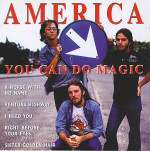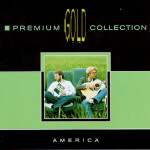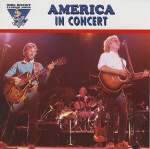
Finally, after a seven-year absence, America returned to the recording studio in 1991. It was part of Rhino Records' Encore: More Greatest Hits project, meant to be a greatest hits companion to the classic 1975 History collection. The new compilation featured hits not included on the original, like "Today's The Day," "You Can Do Magic," "Right Before Your Eyes," and "The Border," along with other choice album cuts. While the rare original version of "Everyone I Meet Is From California" (the B-side of "A Horse With No Name" which was not included on America) was included in the package, as was the uncut version of "Can't Fall Asleep To A Lullaby" (finally spelled correctly), "California Dreamin'" unfortunately wasn't.
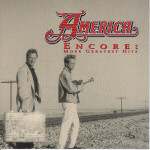 For the album Beckley and Bunnell came up with four new songs.
Bunnell's "Nothing's So Far Away (As Yesterday)", co-written by old Capitol
cohorts Robert Haimer and Bill Mumy, seemed a perfect choice to start their
first album in over half a decade, and it demonstrated that America was
capable of coming back in full form, which has not always been the case in
recent attempts to revive classic groups. "Nothing's So Far Away" featured
slick production on par with Perspective but a more acoustic,
guitar-driven sound to update their live sound. Beckley was next with "On
Target", co-written with Mumy and produced by Steve Levine. "On Target", a
lively pop song, was notable in that Beckley showed off his musical talents
by playing all the instruments himself, including the drum machine, bass and
synthesizers plus singing the lead vocals and harmonies. "Hell's On Fire"
returns us to Bunnell, who, with help again from Haimer and Mumy, presents a
concert-friendly torrid rocker featuring a blazing guitar riff from Mumy
himself. Finally, Beckley came up with "The Farm", a song about the plight
of the modern American farmer (including a cameo by Gerry's Daisy
character). "The Farm" is very much a solo effort, even more so than "On
Target", and it not only features Gerry on all the instruments (in this
case, merely a piano and synthesizers), but as sole writer and producer as
well. The song was recorded in Beckley's Human Nature Studios -- located in
the basement of his Sherman Oaks, California, home -- a place which would
see a lot of action over the next few years. Beckley's relative creative
independence in making his Encore tracks hinted strongly at his
long-lasting desire to produce solo material.
For the album Beckley and Bunnell came up with four new songs.
Bunnell's "Nothing's So Far Away (As Yesterday)", co-written by old Capitol
cohorts Robert Haimer and Bill Mumy, seemed a perfect choice to start their
first album in over half a decade, and it demonstrated that America was
capable of coming back in full form, which has not always been the case in
recent attempts to revive classic groups. "Nothing's So Far Away" featured
slick production on par with Perspective but a more acoustic,
guitar-driven sound to update their live sound. Beckley was next with "On
Target", co-written with Mumy and produced by Steve Levine. "On Target", a
lively pop song, was notable in that Beckley showed off his musical talents
by playing all the instruments himself, including the drum machine, bass and
synthesizers plus singing the lead vocals and harmonies. "Hell's On Fire"
returns us to Bunnell, who, with help again from Haimer and Mumy, presents a
concert-friendly torrid rocker featuring a blazing guitar riff from Mumy
himself. Finally, Beckley came up with "The Farm", a song about the plight
of the modern American farmer (including a cameo by Gerry's Daisy
character). "The Farm" is very much a solo effort, even more so than "On
Target", and it not only features Gerry on all the instruments (in this
case, merely a piano and synthesizers), but as sole writer and producer as
well. The song was recorded in Beckley's Human Nature Studios -- located in
the basement of his Sherman Oaks, California, home -- a place which would
see a lot of action over the next few years. Beckley's relative creative
independence in making his Encore tracks hinted strongly at his
long-lasting desire to produce solo material.
The final lyrics from "The Farm" -- "Where do we go from here?" -- capture the uncertainty which followed this first, tentative project of the 1990s. Many classic rock groups, including America, continued to tour, but with the notable exception of the Doobie Brothers, their live acts were far more commercially successful than their new recordings. Encore fell victim to this as well, as the album failed to chart and America was dropped from the Rhino roster. Without a contract to record a follow-up to Encore, they continued to do what they have done so well for so long: tour.
Meanwhile, the group's past material, for so long derided by critics, was finally being considered classic rock. When Encore was released in July 1991, it was only the fourth America album to be released on compact disc (the others being In Concert in 1985 and History and America in 1987). In 1992, Warner Brothers reissued Homecoming, Hat Trick, Holiday, Hearts, Hideaway, Harbor and Live on CD in Japan, albums long out of print up until then. In 1994, Capitol Records re-released View From The Ground internationally, beginning in Australia. By 1997, a multitude of America compilations had appeared around the world, including a European repackaging of 1985's In Concert, a CD-ROM of an America concert in Germany in 1975 which included Dan Peek, plus various compilations of America's Capitol material (Ventura Highway And Other Favorites, You Can Do Magic, and the Centenary and Premium Gold collections). Interestingly, many of the Capitol compilations featured Dan Peek on the cover, trying to cash in on America's 1970s popularity as much as possible. Peek's solo album, All Things Are Possible, was released on CD in 1995. King Biscuit released its 1982 America broadcast on CD in 1995 (with two totally different packaging styles), and the Live In Central Park laserdisc was re-released in 1997 with a newly remastered audio track in Dolby stereo.
A recent edition of the Rolling Stone Rock Encyclopedia states that Dan Peek rejoined America in 1993. While this is inaccurate, it does reflect an innovation in America concerts from around that time: a willingness to reexplore Peek's material. Brad Palmer, the band's bassist, took up the Peek vocal roles before pleasantly suprised audiences, who heard "Don't Cross The River" and "Lonely People" live for the first time in nearly two decades.
During concerts in 1993, America played some new songs, including "Greenhouse," and then informed audiences around the world that they had signed a new recording contract with American Gramaphone Records and were working on a new album -- their first full-length studio album in a decade. At a concert at the Ventura Concert Theater in June 1993, for example, such news brought the audience to its feet with a loud, standing ovation. America was back.
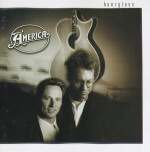 In May 1994, Hourglass was released, their first "H" album since
Harbor seventeen years before. The title referred to the fact that
America had managed to stay together for so long, a theme which comes across
most pointedly in the numerous reflective comments in the liner notes. It
is worthwhile reprinting some of Dewey's musings here:
In May 1994, Hourglass was released, their first "H" album since
Harbor seventeen years before. The title referred to the fact that
America had managed to stay together for so long, a theme which comes across
most pointedly in the numerous reflective comments in the liner notes. It
is worthwhile reprinting some of Dewey's musings here:
Here it is 1994! Twenty-four years since "America" formed...straight out of high school! Sometimes it seems like yesterday and other times it feels like a lifetime ago. This is album number 18 ... or something! A lot has changed in this last quarter century; this album was digitally recorded using the latest state-of-the-art technology and instrumentation of course, but some things haven't changed. Harmony voices sound just as nice as they always did. Notes and words and pianos and guitars sound just like they used to, and it feels good to be making a new record!
Hourglass, produced by Beckley and Bunnell, was notable for its various musical directions, much more so than on any previous album. The album opened with a fanastically soothing intro on "Young Moon", a soft, harmonious song which was one of the most pleasing America numbers since "Survival". The song was co-written by Bunnell (who sang lead vocals) and Beckley, which deviated from their long-standing practice of writing songs separately. It included a beautifully atmospheric orchestral layering by Chip Davis, known for his work with Manheim Steamroller, and electric guitar work by Hank Linderman, who contributed to most tracks and assisted with the production. "Hope" -- a straightforward song about, well, hope -- was Gerry's standout track, recorded, as were most on the album, at his Human Nature Studios. The anthem-like track incorporated much of the Beckley musical wizardry first seen on Encore. "Close To The Wind" was practically a repeat performance of "On Target", with Steve Levine producing at Do Not Erase studios, and Gerry doing just about everything else except for Dewey's background vocals. "Mirror To Mirror", another Beckley piece, quickly became a concert favorite. Dewey's more acoustical tastes come out in "Sleeper Train", "Whole Wide World", and "Garden Of Peace", the latter song featuring longtime friend Carl Wilson on background vocals. "Call Of The Wild" was Beckley's stab at an acoustic song.
Studio heriocs were only a part of the album, however. The enduring stage lineup of Bunnell, Beckley, Palmer, Woods and Leacox contributed two live-flavored tracks in "Greenhouse" and a revived "Everyone I Meet Is From California", with Bunnell taking up Peek's vocals. The latter was one of two-remade tracks on the album, the other being "You Can Do Magic". The re-recorded tracks were an acknowledgement of both Peek's contribution to the group and its longetivity beyond Peek's departure.
Unfortunately, Hourglass proved to be less than a whopping success commercially, once again failing to chart. After more touring to support the album, Beckley took some time off to record the solo album he had waited so long to make. Once again setting up shop at his Human Nature Studios, Beckley turned out as home-spun an album as was possible. All his old friends were there, such as Dewey on "Sunrise Sunset" (a song which includes a reference to the destructive 1994 Northridge earthquake), Willie Leacox on "Only A Kid At Heart", Carl Wilson with background vocals on "Kiss Of Life", Matthew McCauley on "One Day's Duning", and Timothy B. Schmit contributing to Beckley's revamped "I Need You", which now featured an impressive sax solo by Richie Cannata. Henry Diltz was hanging around again with his camera. Hank Linderman, who helped out on Hourglass, was a major force in Gerry's solo project, engineering and co-producing the album along with providing rocking guitar work on what turned out to be the title track, "Van Go Gan", among others. Beckley even got his own family involved, bringing in his teenage son Matthew for handclaps on "Van Go Gan", and recording the innocent googlings of his young son, Joe, for "Playing God". "Playing God" also featured an uproarious send-up of televangelists by SNL comic Phil Hartman: "Buy now and receieve the prayer towel, holy golf divot repair tool, and blessed red plastic martini olive swords, no extra charge."
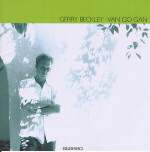 The album, which eventually got the name Van Go Gan from a play on
the names of artists Vincent Van Gogh and Paul Gauguin, was released in
late 1995 only in Japan for Polystar Records, depriving Beckley of the
chance for a solo success in the United States. Still, the album received
instant praise as a masterpiece from many an America fan. Like America's
Hourglass, Beckley's Van Go Gan was a mixture of styles and influences.
"Emma" is a straightforward rocker which could easily grace an America
album. "Sunrise Sunset" and "Goodbye Highway" both start out mellow, then
build up to energetic climaxes. "Van Go Gan" is a moody mixture of
heavily-layered synthesizers and electric guitars reminiscent of Beckley's
proto-solo efforts from Encore and Hourglass. Aside from "I Need You",
Van Go Gan reflects early America influences with "Now Sue", a smooth song
with exquisite harmonies based upon the structure of "Till The Sun Comes Up
Again" from Homecoming.
The album, which eventually got the name Van Go Gan from a play on
the names of artists Vincent Van Gogh and Paul Gauguin, was released in
late 1995 only in Japan for Polystar Records, depriving Beckley of the
chance for a solo success in the United States. Still, the album received
instant praise as a masterpiece from many an America fan. Like America's
Hourglass, Beckley's Van Go Gan was a mixture of styles and influences.
"Emma" is a straightforward rocker which could easily grace an America
album. "Sunrise Sunset" and "Goodbye Highway" both start out mellow, then
build up to energetic climaxes. "Van Go Gan" is a moody mixture of
heavily-layered synthesizers and electric guitars reminiscent of Beckley's
proto-solo efforts from Encore and Hourglass. Aside from "I Need You",
Van Go Gan reflects early America influences with "Now Sue", a smooth song
with exquisite harmonies based upon the structure of "Till The Sun Comes Up
Again" from Homecoming.
By 1995, America had finally joined the information superhighway. Rick Wahlgren and Ike Gauley, close friends of Dewey and Gerry's, set up an offical America home page, while Sue Robbins distributed a cyber-newsletter, the "America Express". A year later, Steve Lowry created a second home page for America Fans to trade experiences with the group. It's been a long time since the only way America fans could get information on the group was by writing to Crossroads Of The World.
In early 1996, for the first time in nearly thirteen years, an America song came to prominence, albeit indirectly. George Briner, Chairman of Project Hope, heard the track "Hope" from Hourglass and decided to use it as the theme song for a fund-raising drive for the T.J. Martell Foundation for Leukemia, AIDS and Cancer Research. Featuring nearly fifty country artists, including Trisha Yearwood, Vince Gill, and Faith Hill, the ensuing "Hope" single was produced on a scale similar to the USA For Africa and Band Aid efforts of the mid-1980s. Many of those artists regathered on prime-time TV at the Country Music Awards in April 1996 to perform the song live.
In June 1997, with Hourglass three years in the past, the group announced that it was planning to record a new album at the end of the year, to be produced by Gary Katz of Steely Dan repute. Meanwhile, the America revival continued with a further announcement by One Way Records of the imminent release of the remainder of the Capitol albums on compact disc.
Over the nearly three decades that America has performed, a period which has seen many faces and styles come and go, America has proven that a group once maligned as a fly-by-night ripoff could endure by being outstanding instead of outrageous.


Copyright ©1998 John Corbett. All rights reserved.
Written: 24 July 1997
Last Revised: 23 January 1999


